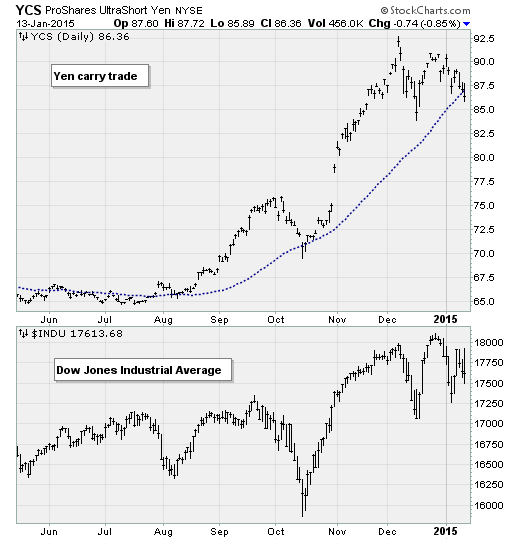Why are stocks so jumpy?
Wall Street went for a ride Tuesday, with the Dow Jones Industrial Average oscillating in a 425 point range from high to low before closing with a 26 point decline. In other words, the closing numbers fail to capture what was an epic, volatile session.
The turbulence is coming as a shock to many, given that investor sentiment was red hot heading into the new year. But the tremors aren't coming out of nowhere, following some whipsaw action over the last few weeks. Around the Christmas holiday, more than 90 percent of the stocks in the Standard & Poor's 500 were above their 10-day moving average. A week later, less than 10 percent were. That's never happened before.
The problem (as I previously discussed here and here) is that there are a number of major, market-moving catalysts set to happen over the next few weeks alone. The near-term events are focused in Europe, with apprehensive traders already increasing currency market volatility in preparation.
Over the last few years, currency moves have had a larger and larger impact on the stock market. The Dow has taken to following the movements of the Japanese yen on a tick-for-tick basis as computer trading algorithms base their buying and selling of stocks not just on things like earning, Federal Reserve policy, economic growth and job-creation, but also on the vagaries of the foreign exchange market -- one of the more wild, speculative, and volatile areas of the global financial system.
So it's no surprise that stocks are jumpy. As volatility has intensified, hedge fund investors face being forced to quickly cover so-called "carry trade" positions, in which stock and bond trades are funded by "shorting" or selling a weakening currency (something I discussed as far back as last March).
The most popular of these carry trades is the Japanese yen carry. A proxy for this can be seen in the ProShares UltraShort Yen (YCS), an exchange-traded fund that uses futures to provide double inverse exposure to the yen's daily movements. As the chart above shows, the Dow has closely followed the movements of the YCS since last summer with a tight correlation.
The trouble is that on Tuesday, the YCS closed below its 50-day moving average -- a measure of medium-term trend -- for the first time since July. If the yen carry suffers a breakdown here, which looks likely, hedge funds and other institutional traders will be forced to sell stocks and bonds to close their carry trades.
Another indication of a coming trend reversal comes from the government's latest Commitment of Traders report, which provides insight into the positioning of futures traders. According to Jason Goepfert at Sundial Capital Research, it showed "a dramatic acceleration" in bets against the U.S. dollar (and thus against the yen carry trade). These bets were already near a record and have now moved to a new all-time extreme.
Goepfert notes that when we see such an acceleration in futures positioning when at or near a record, it tends to come very near an inflection point for the underlying asset. That suggests the yen carry trade will weaken as the yen strengthens against the dollar.
An early tell will be provided by the performance of Japan's Nikkei stock index in the days to come, which has also been very sensitive to the movements of the yen versus the dollar. Unlike the Dow, the Nikkei has already fallen to test its early-January and mid-December lows. A breach would put the mid-October lows back in play. For the Dow, that would be worth a 10 percent decline from its current level and take the index back below the 16,000 level.
As for the euro, anything that jeopardizes the market's assumption that the European Central Bank is set to unleash a massive new stimulus program could send the euro higher, pinching carry trades by reversing the recent strong dollar versus weak euro trend. This could come as soon as Wednesday morning when a European court will issue a statement on the legality of the ECB's government bond buying proposal.
With regular investors watching in horror as their stock portfolios zip from gains to losses like penny stocks, point the finger of blame over at the foreign exchange traders.
